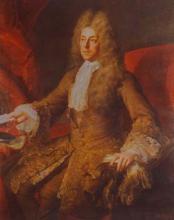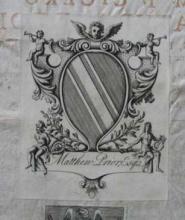Matthew Prior (1664-1721)
Matthew Prior took to poetry at an early age, translating Horace for the entertainment of the Earl of Dorset in his uncle's tavern. He attended Westminster School, and later studied at St John's, gaining his BA in 1687. After spending some years as a Fellow of the College, and continuing to write poetry, he became secretary to the British ambassador to the Hague, where he was eventually to become involved in drawing up the Treaty of Ryswick at the end of the Nine Years War (1697). Subsequently he was transferred briefly to the embassy in Paris, before returning to England to pursue a political career. Initially a whig, the Earl of Dorset gave him the pocket borough seat of East Grinstead, but his sympathies swung towards the tories whilst in Parliament. This change of alliegance cost him friends and patronage, but he soon gained others on the tory side, most notably Jonathan Swift, who became a close friend. In 1711 Prior was sent to Paris by Robert Harley, Earl of Oxford and Lord Treasurer. Here he drew up documents that were to become the basis for the Treaty of Utrecht, ending the War of the Spanish Succession in 1713, and became plenipotentiary. On his return, with the whigs in ascendancy, Prior was imprisoned for a year by a secret committee investigating corruption in the tory party. His political career was effectively over, so to boost his funds a group of friends and admirers, including Alexander Pope, arranged the publication of a volume of his collected poetry in a subscription edition (1718). This plan succeeded very well, and Prior spent his final years collecting, writing and planning his country estate. Always of a weak constitution, he died suddenly, whilst visiting Wimpole Hall near Cambridge.
Books given by Prior
Prior gave several volumes while Senior Fellow of the College, but after his death he bequeathed books to the value of £200 from his own extensive library, as well as a large paper copy of the 1718 edition of his collected poems. This amounted to around 200 volumes, which are, perhaps unsurprisingly for a diplomat to Louis XIV's court, dominated by works on European, particularly French, history and politics. There are also, however, a notable selection of texts on travel, and on art and architecture. Among the more interesting items are:
- Several volumes of contemporary political pamphlets, including the articles of foundation for the Compagnie des Indes Orientales (1664), and several issues of the Treaty of Ryswick.
- A selection of geographical texts, detailing foreign lands and customs, from the corsairs of the Barbary coast to the wastes of Lapland. These are often illustrated, for example a translation of Joannes de Laet's description of the West Indies (1640). The collection also includes Caspar van Baerle's description of Brazil (1647), rare because most copies were destroyed in a fire in the publisher's warehouse, and L'ardante ou flamboyante colom de la mer (1644), a book of nautical charts and pilot guides.
- Two Italian volumes of incunabula concerning the natural sciences: an edition of Pliny's Naturalis Historia of 1496 with hand-coloured initials, and an illustrated collection of classical writers on astronomy from 1499.
- The first edition of the Old Testament in Irish, Leabhuir na Seintiomna (1685).
- Several volumes with the French Royal arms in gilt on the binding, one in particular bound ornately for Louis XIV.
Provenance markings
All Prior's volumes bear his bookplate, usually on the verso of the title-page. Prior's collection is one of the few named collections shelved separately in the Upper Library, where it occupies class B.

